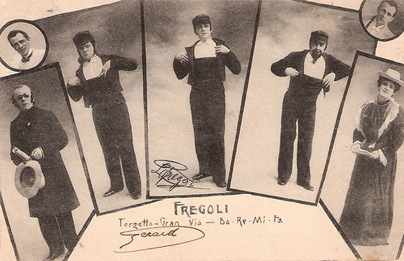
The human mind is a tremendous thing – there are so many facts revealed about it, and so many things which still remain an enigma for us. Science is struggling to explain such strange developments, but still unable to describe their actual origins. Although majority of us are already familiar of a few mental conditions on this list, several others are very strange, unfamiliar and beyond the boundary of logical domain. Checkout if you have any of the following strangest mental conditions. Here is a collection of top 15 strangest conditions of the Human Mind.
1- Prosopagnosia

Prosopagnosia is a mental condition in which a person is ineffective to distinguish faces of people or objects that they should know. People going through this disorder are typically capable of using their other senses to recognize people – for instance a person’s perfume, the shape or style of their hair, the sound of their voice, or even their gait. A famous case of this phenomena was mentioned in the 1998 book (and later Opera by Michael Nyman) called “The man who mistook his wife for a hat”.
2- Fregoli Delusion

Fregoli delusion is an uncommon mental condition in which a person holds the impression that different people are, in fact, the same person in an assortment of disguises. It is frequently related to paranoia and the impression that the person in disguise is attempting to persecute them. The delusion is named after the famous Italian actor Leopoldo Fregoli who was renowned for his skill to make quick changes of appearance during his stage act. It was first accounted in 1927 in the case study of a 27-year-old woman who thought she was being persecuted by two actors whom she often went to see at the theatre. She reported that these people “pursued her closely, taking the form of people she knows or meets”.
3- Capgras Delusion

Capgras delusion is a mental condition in which a person believes that a close friend or family member has been replaced by an identical looking faker. This could be associated with the old belief that babies were slipped and replaced by changelings in medieval folklore, and the modern idea of aliens seizing the bodies of people on earth to live amongst us for reasons unknown. This delusion is frequent among those who are schizophrenic; however it can also occur in other disorders.
4- Nihilistic delusion

Nihilistic delusion is a condition whose theme centers on the nonexistence of self or parts of self, others, or the world. A person with this type of delusion may have the false hallucination that the world is ending.
5- Erotomania

Erotomania is a mental condition in which a person starts to think that another person, usually someone of higher status, is in love with him or her. It is, however, rare for people with this type of delusion to try to contact the other person (through phone calls, letters, emails, gifts, and sometimes stalking).
6- L’esprit de l’Escalier

L’esprit de l’escalier (French= stairway wit) is the sensation of thinking of an ingenious counter when its too late. The phrase can be used to portray a comeback to an insult, or any witty, quick remark that comes to mind too late to be helpful—when one is on the “staircase” leaving behind. The German word “treppenwitz” stands for the same condition. In English, the phrasal idiom describes this condition as “being wise after the event”. This condition frequently comes with a feeling of regret at having not thought of the riposte when it was most required or appropriate.
7- Grandiose delusion

In this type of delusion, a person overdraws his / her sense of self-importance and believes that he or she has special powers, talents, or outstanding skills. At times, the subject would believe that he/ she is a celebrity (for example, a rock star or Jesus Christ). Normally a person with this delusion is convinced he/ she has achieved some great accomplishment for which they have not received enough credit or recognition.
8- Presque Vu (Almost Seen)

Presque vu is almost similar to the “tip of the tongue” feeling – it is the strong sensation that you are about to go through an epiphany – though the epiphany rarely happens. The condition of presque vu can be very disorienting, perturbing and distracting.
9- Jamais Vu (Never Seen)

Jamais vu stands for a familiar situation which is not recognized. It is often regarded the opposite of déjà vu and it comprises a sense of eeriness. The observer does not distinguish the situation despite knowing logically that they have been there before. It is usually described as when a person shortly doesn’t recognize a person, word, or place that they actually know. Chris Moulin, a researcher at Leeds University, inquired 92 volunteers to write up “door” 30 times in 60 seconds. He accounted that 68%of his guinea pigs showed symptoms of jamais vu, such as starting to doubt that “door” was a real word. This makes clear that jamais vu might be an indication to brain fatigue.
10- Déjà Senti (Already Felt)

Déjà senti is the mental process of having “already felt” something. This is totally a mental phenomenon and rarely remains in your memory subsequently. A person diagnosed with Déjà Senti has accounted that “What is occupying the attention is what has occupied it before, and indeed has been familiar, but has been forgotten for a time, and now is recovered with a slight sense of satisfaction as if it had been sought for. The recollection is always started by another person’s voice, or by my own verbalized thought, or by what I am reading and mentally verbalize; and I think that during the abnormal state I generally verbalize some such phrase of simple recognition as ‘Oh yes—I see’, ‘Of course—I remember’, etc., but a minute or two later I can recollect neither the words nor the verbalized thought which gave rise to the recollection. I only find strongly that they resemble what I have felt before under similar abnormal conditions.”
You may consider it as the sensation of having just mouthed, but acknowledging that you, actually, didn’t utter a single word.
11- Déjà Visité (Already Visited)

Déjà visité is a rare mental phenomenon and it exemplifies a preternatural knowledge of a new place. For instance, you may have a go at it your way around a totally new town or a place you may have never been before, and knowing that it is not possible for you to have this knowledge. Déjà visité is related to spacial and geographical relationships, while déjà vécu is related to temporal happenings. Nathaniel Hawthorne reported about an experience of this condition in his book “Our Old Home” in which he visited a ruined castle and had eerily known everything about its layout. Later on, he was able to trace the experience to a poem he had read many years early by Alexander Pope in which the castle was precisely described.
12- Déjà Entendu (Already heard)

Déjà Entendu is a sensation in which sounds or voices have been heard in the past.
13- Déjà Vécu (Already lived through or experienced)

Déjà vécu is what most individuals are actually going through when they think they are experiencing deja vu. Déjà vu is the feeling of having seen something before, whereas déjà vécu is the sensation of having seen an event before, but in great detail – such as recognizing smells and sounds. This is also typically accompanied by a very strong feeling of recognizing what’s gonna come next. In my own experience, I have not only recognized what was going to come next, but have been able to tell those around me what’s gonna come next – and I was 100% correct. Well, this is a very strange and unaccountable feeling…
14- Déjà Voulu (Already Wanted)

Déjà Voulu is a sensation of disturbance of memory in which an individual believes that his or her present desires are incisively the same as desires held some time earlier.
15- Déjà Vu (Already Seen)

Déjà vu is the experience of being sure that you have experienced or seen a new situation before – you experience as though the event has already occurred or is repeating itself. This condition is typically accompanied by a strong sense of familiarity and a sense of strangeness, eeriness, or bizarreness. The “previous” feeling is generally assigned to a dream, but from time to time there is a very sure sense that it has really happened in the past.




































